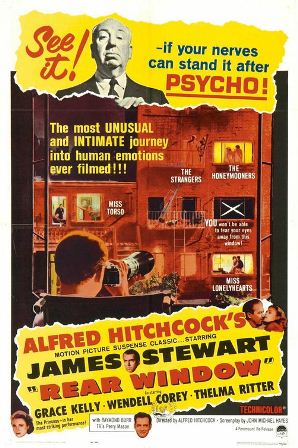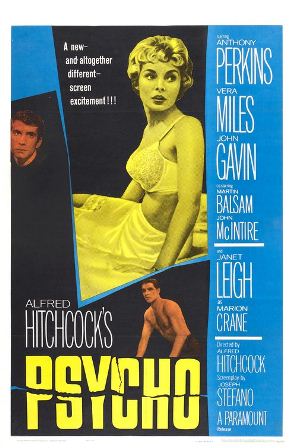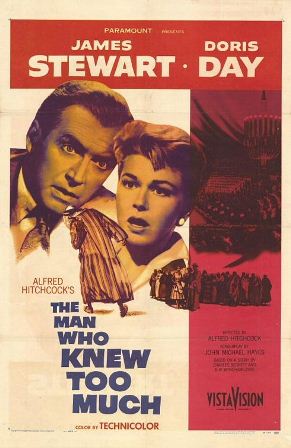CHICAGO – Patrick McDonald of HollywoodChicago.com appears on “The Morning Mess” with Dan Baker on WBGR-FM (Monroe, Wisconsin) on March 21st, 2024, reviewing the new streaming series “Manhunt” – based on the bestseller by James L. Swanson – currently streaming on Apple TV+.
Film Feature: The 10 Best Hitchcock Jaw-Droppers
3. The Break-In in “Rear Window” (1954)

Rear Window
“Vertigo” is unquestionably one of Hitchcock’s greatest films, and perhaps his most achingly personal, but when it comes to the Master’s best film of all time, I argue that the honor goes to this phenomenal dissection of cinema’s voyeuristic allure. With his leg in a cast, restless photographer Jeff (Jimmy Stewart) has nothing to do but spy on his fellow apartment dwellers through his enormous rear window. There’s the songwriter struggling to make end’s meat, the old maid dubbed “Miss Lonelyhearts,” and the ominous gentleman named Lars Thorwald (Raymond Burr), who Jeff suspects has butchered his wife. In order to help him get to the bottom of this mystery, Jeff’s girlfriend, Lisa (Grace Kelly at her most sublime), decides to investigate the Thorwald residence on her own. This is one of many masterful moments in the film where Hitch’s various individual plot lines start to intertwine in stunning and unexpected ways. As Jeff watches Lisa climb up into the empty apartment, he notices that Miss Lonelyhearts is on the brink of taking a deadly overdose. He moves to dial the police but stops when he realizes that the songwriter’s entrancing music has stopped the woman from performing the horrible deed. It’s at this precise moment that Thorwald suddenly materializes in front of his apartment, though Jeff can’t warn Lisa because it would blow his cover. As one life is salvaged, another threatens to meet its end.
2. The Shower in “Psycho” (1960)

Psycho
So much has been written about why this scene rocked audiences to their
very core and how it changed cinema forever. Watching lovely leading lady Janet Leigh murdered in such a gruesome and inexplicable way is no less disturbing today than it was during the film’s initial release. Yet Gervasi’s upcoming film, “Hitchcock,” obscures and misrepresents what truly makes the scene so brilliantly perverse. Hitchcock’s obsession with his leading ladies and his insecurity about his own unappealing physicality is expertly chronicled in Donald Spoto’s book “Spellbound by Beauty” (and to a lesser extent in HBO’s “The Girl”). In many ways, the shower scene is a precursor to the rape scene in “Marnie,” as the vulnerable Marion Crane (Leigh) is penetrated by the phallic knife. Her attacker, “Mother Bates,” is an embodiment of all the doting, smothering, vaguely sinister mothers that populated past Hitchcock thrillers (from the fiercely wicked Leopoldine Konstantin in “Notorious” to the dangerously clueless Marion Lorne in “Strangers on a Train”). It could also be argued that these mother figures represent Hitchcock’s wife, Alma, and the maternal role that she took in her husband’s life. While Gervasi’s “Hitchcock” softens and sentimentalizes the trials and tribulations of their relationship, “The Girl” offers a starker and more convincing account of the childlike genius and the motherly guardian who allowed him to indulge in his increasingly obscene fantasies. “Psycho” marks the moment when these fantasies built to a head and threatened to tear through the screen. Boy did they ever.
1. The Concert in “The Man Who Knew Too Much” (1956)

The Man Who Knew Too Much
Here’s the scene that made me an official Hitchcock fan. It may not be the Master’s very best picture, but it sure is one of his most satisfying, as it guides the audience on a twisting road toward its unforgettable set-piece at the Albert Hall. Ben (Jimmy Stewart) and Jo (Doris Day, in a riveting performance) are desperately pursuing their kidnapped child when they learn of an assassination planned to take place at an upcoming concert. Once Jo arrives, she’s threatened by the assassin that her child will be in grave danger if she interferes with his work. As Bernard Herrmann conducts the orchestra and choir in performing Arthur Benjamin’s gloriously foreboding “Storm Cloud Cantata,” Ben races for help while Jo writhes in tortured anxiety. Hitch cuts between Ben, Jo, the smirking assassin, the doomed Prime Minister and the cymbalist whose single climactic clash will drown out the sound of the killer’s gunshot. Day’s facial expressions anchor the sequence in a visceral emotional reality, while George Tomasini’s editing functions as a metronome for the audience’s pulse. Best of all, the scene plays out with absolutely no dialogue to distract from the powerful marriage of visuals and music. Whereas Hitchcock’s original version of the scene (in his inferior 1934 version of “Man Who Knew Too Much”) sped up the concert and left little time for the suspense to build, the remake allows the action to unfold at the same speed as Benjamin’s composition, and when both reach their crescendo, the results are truly explosive. The Albert Hall sequence is a spellbinding masterpiece of pure cinema from a filmmaker whose genius stretched all the way back to the silent era and remains as vital and influential as ever.
 | By MATT FAGERHOLM |
- « first
- ‹ previous
- 1
- 2
- 3


